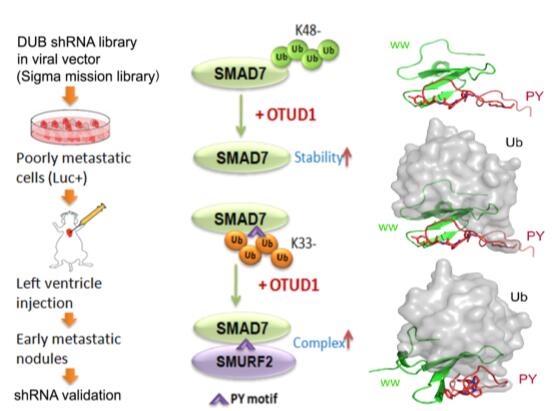Metastasis is the main cause of death in cancer patients. TGF-β is pro-metastatic for malignant cancer cells. Here we report a loss-of-function screen in mice with metastasis as readout and identify OTUD1 as a metastasis-repressing factor. OTUD1-silenced cancercells show mesenchymal and stem-cell-like characteristics. Further investigation reveals that OTUD1 directly deubiquitinates the TGF-β pathway inhibitor SMAD7 and prevents its degradation. Moreover, OTUD1 cleaves Lysine 33-linked poly-ubiquitin chains ofSMAD7 Lysine 220, which exposes the SMAD7 PY motif, enabling SMURF2 binding and subsequent TβRI turnover at the cell surface. Importantly, OTUD1 is lost in multipletypes of human cancers and loss of OTUD1 increases metastasis in intracardial xenograft and orthotopic transplantation models, and correlates with poor prognosis among breast cancer patients. High levels of OTUD1 inhibit cancer stemness and shuts offmetastasis. Thus, OTUD1 represses breast cancer metastasis by mitigating TGF-β-induced pro-oncogenic responses via deubiquitination of SMAD7.
Thein vivo genetic screen identifies OTUD1 as potent suppressor of breast cancer metastasis(Left panel). OTUD1 cleaves K48-poly-ubiquitin chain of SMAD7and sustains SMAD7 stability. OTUD1 also cleaves K33-poly-ubiquitin chain on SMAD7 Lysine 220, which stabilizes the SMAD7-SMURF2 complex and promotes the degradation of TβRI. (middle&Right panels)

Graduate students Zhengkui Zhang, Yao Fan and Feng Xie are co-first authors of this study, and Professor Long Zhang is the corresponding author.This work was supported by a special program from Ministry of Science and Technology of China, the Chinese National Natural Science Funds, PCSIRT, Jiangsu National Science Foundation (BK20150354 to F.Z.), the key R&D projects of Zhejiang provinceand Zhejiang outstanding youth fund.
Link:https://www.nature.com/articles/s41467-017-02029-7



